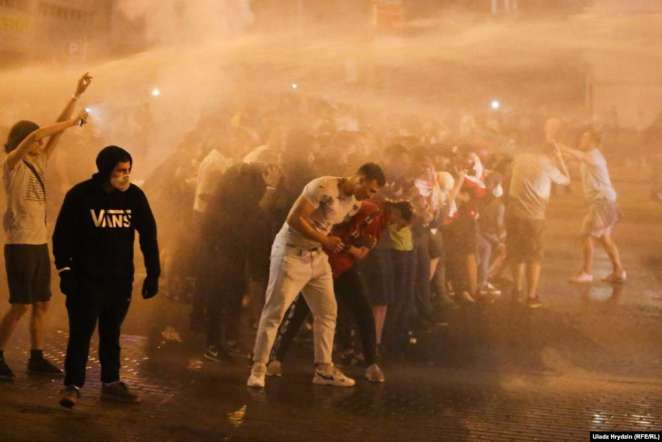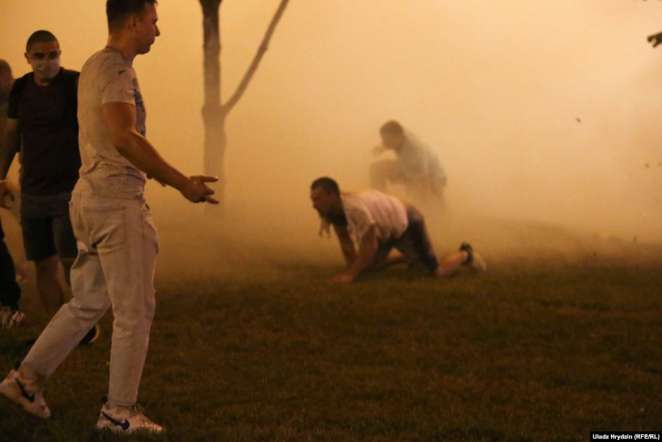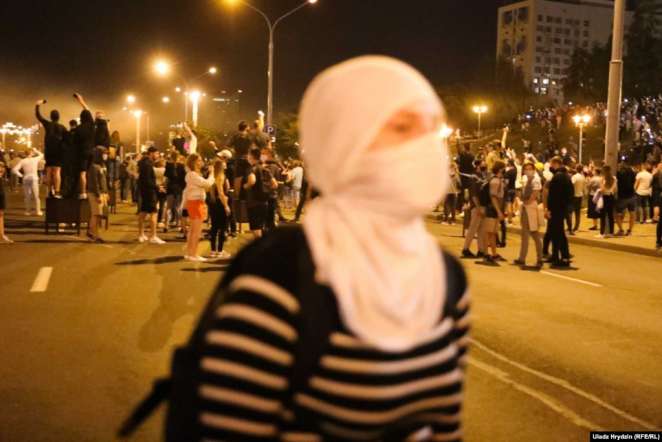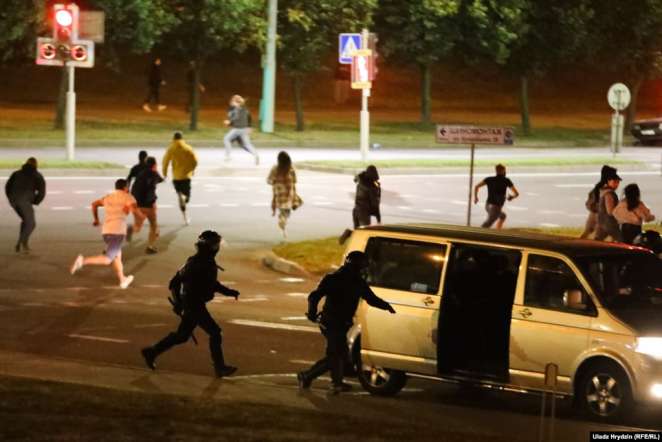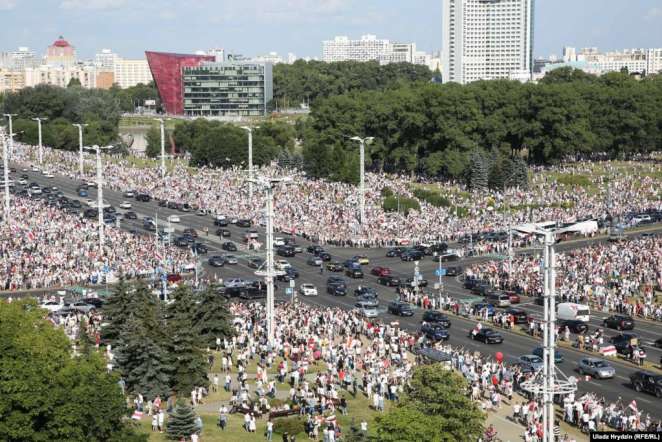Belarus Protest Photographer: What I Saw
Rferl
23 August 2020, 15:16
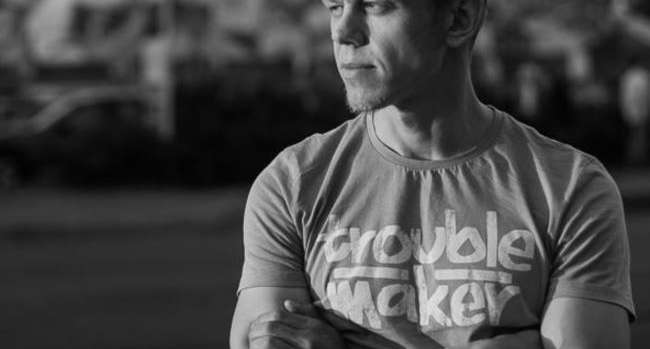 Uladz Hrydzin (pictured below) has worked as an accredited photographer with RFE/RL’s Belarus Service since 2017. The following is his account, edited for length and clarity, of what he witnessed while covering the unrest since Belarus's disputed August 9 presidential election.
Uladz Hrydzin (pictured below) has worked as an accredited photographer with RFE/RL’s Belarus Service since 2017. The following is his account, edited for length and clarity, of what he witnessed while covering the unrest since Belarus's disputed August 9 presidential election.
When the election results were coming in, I was with colleagues covering an opposition press conference. We started hearing that people were out in the streets and moving toward downtown; that something big might be about to happen.
Some colleagues and I drove into central Minsk, and as we got close to the Hero City Obelisk we could hear what sounded like shooting.
Initially there was a kind of standoff between a wall of riot police (OMON) and protesters who were putting up little makeshift barricades, if you could call it that. Then the police advanced and tried to disperse the crowds with water cannon. When that failed, they started firing rubber bullets and flash-bang grenades.
From what I could see, the flash-bangs were spraying some kind of shrapnel. People were dropping to the ground after the grenades exploded with torn skin on their faces and bodies.
One flash-bang exploded right at my feet. I felt the shock wave like a big splash hitting my lower body. The bang screwed up my hearing for a couple of days and I felt weird afterward, just out of sorts. My colleague was hit by a fragment of that grenade, but he wasn’t badly hurt.
It’s hard to explain, but I wasn’t actually scared at that point. It was almost like some kind of autopilot kicked in. But I was being careful and trying to avoid being in the middle of things.
The clashes were repeating over and over: Police would advance, people would scatter then regroup, and it would start again. Anyone who was hurt was helped off to the side to wait for an ambulance. That’s where I saw the girl who was wounded in the face. I don’t know what happened to her, or whether she's OK. I’m going to try to find out about her soon.
As it got more violent, I asked at a strangers’ apartment if I could shoot photos from their upper-story living room. They helped me a lot, because it was very dangerous at that point but I was able to safely shoot from a distance.
The Internet blockage meant the only way I could get my photos published was to transfer images to my cellphone, then send them to my editors via Telegram. I asked random strangers at one point to help me with an Internet connection, and they did.
The second night felt the most ominous. I was near the first man who died. I didn’t see the moment he was killed, but I saw the OMON rush at him after he fell to the ground. I was with a group of journalists, and one OMON troop saw us and we think he deliberately shot rubber bullets right at us. A few journalists were hit, including one female colleague.
That night I was scared to be going home alone. Police were just grabbing people off the streets, so it felt very uncertain.
I’ve never seen any protest movement like this in Belarus, or our police behaving so violently. Before, people would run away when the police advanced; this time they stood their ground behind barricades.
For the first week, I was just sleeping three or four hours a night. Now I’m able to rest a little more. The situation now feels less intense, but maybe people are just tired. In the evenings, people are still gathering, but not in such big numbers as before. But I think things may ramp up again over this weekend.
Internet connections are still very poor here, and sometimes it seems like they're being shut down completely. But when the Internet is cut off, more people head into the streets to join the protests, since there is nothing else to do.
I have no idea what is coming, it’s such an unpredictable year. Things are changing so fast that it's impossible to predict what’s ahead. A couple of weeks ago, no one could have imagined that things here would develop like this, that ordinary people would be getting tortured and killed after an election result.
23 August 2020, 15:16

When the election results were coming in, I was with colleagues covering an opposition press conference. We started hearing that people were out in the streets and moving toward downtown; that something big might be about to happen.
Some colleagues and I drove into central Minsk, and as we got close to the Hero City Obelisk we could hear what sounded like shooting.
Protesters being blasted with water cannon in central Minsk on August 9.
Initially there was a kind of standoff between a wall of riot police (OMON) and protesters who were putting up little makeshift barricades, if you could call it that. Then the police advanced and tried to disperse the crowds with water cannon. When that failed, they started firing rubber bullets and flash-bang grenades.
From what I could see, the flash-bangs were spraying some kind of shrapnel. People were dropping to the ground after the grenades exploded with torn skin on their faces and bodies.
Protesters amidst smoke from flash-bang grenades during the clashes on election night.
One flash-bang exploded right at my feet. I felt the shock wave like a big splash hitting my lower body. The bang screwed up my hearing for a couple of days and I felt weird afterward, just out of sorts. My colleague was hit by a fragment of that grenade, but he wasn’t badly hurt.
It’s hard to explain, but I wasn’t actually scared at that point. It was almost like some kind of autopilot kicked in. But I was being careful and trying to avoid being in the middle of things.
The clashes were repeating over and over: Police would advance, people would scatter then regroup, and it would start again. Anyone who was hurt was helped off to the side to wait for an ambulance. That’s where I saw the girl who was wounded in the face. I don’t know what happened to her, or whether she's OK. I’m going to try to find out about her soon.
As it got more violent, I asked at a strangers’ apartment if I could shoot photos from their upper-story living room. They helped me a lot, because it was very dangerous at that point but I was able to safely shoot from a distance.
The Internet blockage meant the only way I could get my photos published was to transfer images to my cellphone, then send them to my editors via Telegram. I asked random strangers at one point to help me with an Internet connection, and they did.
Protestors late on the night of August 9.
The second night felt the most ominous. I was near the first man who died. I didn’t see the moment he was killed, but I saw the OMON rush at him after he fell to the ground. I was with a group of journalists, and one OMON troop saw us and we think he deliberately shot rubber bullets right at us. A few journalists were hit, including one female colleague.
Protesters flee police.
That night I was scared to be going home alone. Police were just grabbing people off the streets, so it felt very uncertain.
I’ve never seen any protest movement like this in Belarus, or our police behaving so violently. Before, people would run away when the police advanced; this time they stood their ground behind barricades.
For the first week, I was just sleeping three or four hours a night. Now I’m able to rest a little more. The situation now feels less intense, but maybe people are just tired. In the evenings, people are still gathering, but not in such big numbers as before. But I think things may ramp up again over this weekend.
Crowds gather in central Minsk on August 16.
Internet connections are still very poor here, and sometimes it seems like they're being shut down completely. But when the Internet is cut off, more people head into the streets to join the protests, since there is nothing else to do.
I have no idea what is coming, it’s such an unpredictable year. Things are changing so fast that it's impossible to predict what’s ahead. A couple of weeks ago, no one could have imagined that things here would develop like this, that ordinary people would be getting tortured and killed after an election result.
